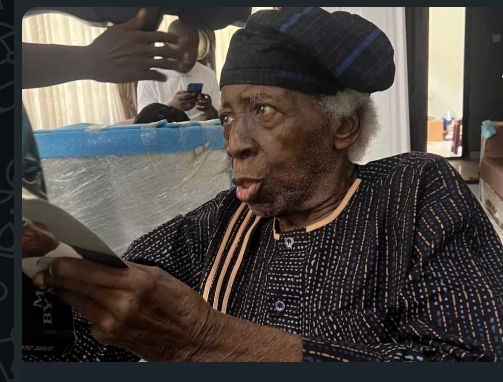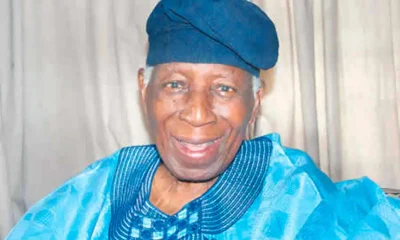News
State Police: Governors To Appoint Police Commissioners, Bill Lists Conditions For CPs Sacking

A bill seeking the amendment of the 1999 Constitution to empower governors to appoint state commissioners of police scaled second reading on the floor of the House of Representatives on Tuesday.
In the alteration to the constitution under consideration, a commissioner of police appointed from among the serving policemen in the state will head the proposed state police in a long-awaited move to decentralise the Nigeria Police Force which has failed to address the spiralling security crisis confronting the country.
The country has been under assault by bandits, kidnappers, and other nefarious characters that daily launch violent attacks on citizens, many of whom are kidnapped, killed, or maimed.
Though the police authorities had initiated various security operations and also deployed more operatives across the country to tackle the insecurity, the crime wave had yet to abate as gunmen operated freely in several urban areas and rural communities.
Titled, ‘A Bill for an Act to alter the Constitution of the Federal Republic of Nigeria, 1999 to Provide for Establishment of State Police and Related Matters,’ the bill, sponsored by the Deputy Speaker of the House, Benjamin Kalu, and 14 others, put the police on the concurrent list.
In the 1999 Constitution, policing is on the exclusive legislative List and therefore, under the direct control of the Federal Government.
Leading the debate on the general principles of the bill, the co-sponsor and member representing Ilorin West/Asa Federal Constituency, Tolani Shagaya noted that the primary purpose of government as enshrined in section 14(2)(b) of the Constitution of the Federal Republic of Nigeria, 1999, is the security and welfare of the citizens.
He added that in the past few years, the nation’s collective security had been greatly challenged, noting that as a result, state police had become inevitable to augment the efforts of the Federal Government to make the country safe for all.
Highlighting some of the key innovations in the proposed alteration bill, he said, “The transfer of police from the exclusive legislative list to the concurrent list, a move that effectively empowers states to have state-controlled policing; the introduction of a comprehensive framework to ensure cohesion as well as accountability and uniform standards between the federal police and state police; the provision of prescribed rigorous safeguards preventing unwarranted interference by the federal police in state police affairs, emphasizing collaboration and intervention only under well-defined circumstances.’’
Shagaya further listed other key provisions of the bill to include the establishment of the state police service commissions as distinct from the Federal Police Service Commission with clearly defined roles and jurisdictions, a re-calibration of the National Police Council to include the chairmen of the state police service commissions, emphasising the collaborative and consultative nature of policing in our federal system.
Other provisions are the recognition of the possible financial challenges that may be faced by state police which would require the Federal Government to provide grants or aid, subject to the approval of the National Assembly, thus ensuring adequate resources for effective policing.
The proposed amendment also provides that the appointment of the state commissioner of police by the governor shall be on the recommendation of the Federal Police Service Commission and the state assembly’s approval.
CP’s removal
However, the CP can be removed by the governor on the recommendation of the Federal Police Service Commission, subject to two-thirds of the state assembly.
Section 215 (4) of the bill provides that, “A state police shall be headed by a commissioner of police who shall be appointed by the governor of the state on the advice of the Federal Police Service Commission from among serving members of the state police subject to confirmation by the state House of Assembly.’’
Section 216 (3) read, “A Commissioner of Police of a state shall only be removed by the governor upon the recommendation of the Federal Police Service Commission praying that he be so removed on the grounds of (a) misconduct in the performance of his official duties (b) breach of policing standards, law, regulation, and code of conduct (c) conviction of any offence involving fraud or dishonesty by a court of law or tribunal and (d) bankruptcy and mental incapacity.’’
It stated that the governor or commissioner under him may give the commissioner of police lawful directive but if considered illegal, the police commissioner may refer the order to the state service commission, which is empowered to take the final decision.
“The governor or such other commissioner of the government of the state as he may authorise on that behalf may give to the commissioner of police such lawful directions concerning the maintenance and securing of public safety and order as he may consider necessary, and the commissioner of police shall comply with those directions or cause them to be complied with.”
Furthermore, the National Assembly shall do certification of the state police service commission bi-annually to make sure it meets national standards.
Section 216 (b) of the bill empowers the state police to bear such arms as may be determined by an Act of the National Assembly.
In all, the proposal contains 18 clauses to alter sections 34, 35, 39, 42, 84, 89 and 129 of the Constitution of the Federal Republic of Nigeria (as altered).
The bill also seeks to alter sections 153, 197, 214, 215, and 216 as well as Chapter IV Part III, Second Schedule, Part II of the Third Schedule, and Part III of the Third Schedule of the Constitution.
Federal police
In the proposed legislation, section 214 of the Constitution (Establishment of Federal and State Police) is altered to distinguish the federal from the state police.
Section 214 (3a) reads, “The federal police shall be responsible for the maintenance of public security, preservation of public order and security of persons and property throughout the federation to the extent provided for under this Act or by an Act of the National Assembly; and
“(b) be responsible the maintenance of public security, preservation of public order and security of persons and property within a State to the extent that the State has power to make laws under this constitution.’’
Subject to the provisions of the constitution, the bill states that the federal police shall not interfere with the operations of any state police or the internal security affairs of any state except to contain serious threats to public order where it is shown that there is a complete breakdown of law and order within a state and the state police are unable to contain the threat.
The federal police can only intervene where the governor requests their intervention to prevent or contain a breakdown of law and order in the state.
Section 216 (1) of the Constitution was also altered to provide the basis for the removal from office of the Inspector General of Police.
Contributing in support of the bill, Ahmed Jaha representing Damboa, Gwoza/Chibok Federal Constituency, Borno State, stated, “It is not the responsibility of the military to help in the maintenance of internal security. They are involved because of the breakdown of our internal security mechanisms.’’
Also speaking, the member representing Ikorodu Federal Constituency, Lagos State, Babajimi Benson, noted that it is the job of the police to maintain law and order.
According to him, “The about 400, 000 policemen we have today cannot effectively cater for the over 200 million Nigerians. If the 36 states of the federation feel they have the funding, they should be allowed to establish state police provided such is not used to perpetrate political ambitions.’’
Other lawmakers who spoke in support of the bill included Aliyu Madaki (Kano) Ademorin Kuye (Lagos) and Bello Kumo (Gombe).
But the member representing Jibia/Kaita Federal Constituency, Sada Soli, expressed misgivings, citing the financial implication of state police at a time when many states were struggling to meet their financial responsibility to their workforce.
Ex-police commissioner
Speaking on the bill, a former Assistant Inspector General of Police, Ali Amodu, stated that while there were fears about the powers being granted to the governors to have control over the state police, it would strengthen the powers of the judiciary, noting that in the end, the citizens would benefit more from giving control of the police to the states.
He noted, “The constitution even provides that they are the Chief Security Officers of their states. If they should have control over the police, the judiciary will be so strengthened that if the governor wants to use the police against his opponents, his opponents will go to court and seek redress.
“My view is that we should not be afraid, we are having a lot of security challenges today, and we should not be afraid of testing this because it is happening in other countries. But of course, it will need an amendment of the Constitution.’’
Endorsing the control of state police by the governors as proposed by the lawmakers, Amodu said any abuse of the police could be addressed by the court.
“Yes, there is no doubt that there are going to be instances of abuse, but this abuse can be taken care of, if we seek redress in court. We have to experiment with this thing. You will see the advantages and disadvantages of anything you want to experiment with.
“But I say in conclusion that the advantages we are going to have from allowing the states to have control of their police, and provide them with equipment, the citizens tend to benefit more,” he said.
In his contribution, a retired Commissioner of Police, Emmanuel Ojukwu said, “State police or no state police, it is a matter of the constitution. Our constitution says that there shall be only one police force.
“If Nigeria wants to have state police, they should amend the constitution and they should go ahead and create the state police. But right now, every state has police of its own but they are not called police by law. That is why we have Amotekun, etc. If we amend the constitution and allow the state to call them by name, such as Kano State Police, etc, no problem.
“Governors already have these avenues working. A good number of them in the state are armed and licensed by the police to hold arms. If all they want is for state police that have been created to begin to have sophisticated weapons, no problem. It is all Nigeria.
“The Federal Police as of now is not as efficient as it should be because the Federal Government that is funding the police is not giving it what it needs. If the states create their police and give it what it needs, there will not be any problem.”
On its part, the Rivers State Government supported the bill on the state police.
The state Commissioner of Information and Communications, Joseph Johnson, in an interview with one of our correspondents on Tuesday, said the bill would strengthen policing and improve security.
He further said the state Governor, Siminalayi Fubara, was privy to the meeting with the President recently when the issue of state Police dominated discussions.
News
“How we imortalised Olunloyo before his death-Makinde

By Kayode Sanni-Arewa
Governor of Oyo State, Seyi Makinde has said he is happy that former governor of the State, Omololu Olunloyo was imortalised before his demise.
Makinde, in a condolence message by his media aide Sulaimon Olanrewaju on Sunday, said the country had lost a patriotic leader, an icon and one of its most cerebral former administrators with the politician’s demise.
The governor said it is sad that the late mathematical guru and administrator passed away before his 90th birthday.
“This death hits differently because I was looking forward to Baba’s 90th birthday, which would have come up on April 14. However, we have to submit to the will of God, who gives and takes lives as He wills.
“My joy is that our government immortalised and honoured Pa Olunloyo in his lifetime and he was present to witness it as we named the Ibadan Airport Road and the Leisure Park on the axis after him in recognition of his service to the state.
“May the Lord grant repose to his soul and give his family the fortitude to bear his demise,” Mr Makinde said.
The death of Mr Olunloyo was confirmed on Sunday morning through a statement by his family.
The deceased died just a few days before his 90th birthday, according to the statement.
News
Iran turns down Trump’s call for direct nuclear talks

Iran’s top diplomat has rejected direct negotiations with the United States as pointless, his office said Sunday, after US President Donald Trump said he preferred face-to-face talks over its nuclear programme.
Trump sent a letter to Iran’s supreme leader Ayatollah Ali Khamenei last month calling for negotiations but warning of military action if diplomacy failed.
On Thursday, the US president said he favoured “direct talks”, arguing they were “faster” and offered a better understanding than going through intermediaries.
But Iranian Foreign Minister Abbas Araghchi said direct talks made no sense with a country “that constantly threatens to resort to force in violation of the UN Charter and that expresses contradictory positions from its various officials”.
“We remain committed to diplomacy and are ready to try the path of indirect negotiations,” he was quoted as saying in a statement issued by his ministry.
Iran keeps itself prepared for all possible or probable events, and just as it is serious in diplomacy and negotiations, it will also be decisive and serious in defending its national interests and sovereignty.”
On Saturday, Iranian President Masoud Pezeshkian said his country was willing to engage in dialogue with the United States on an “equal footing”.
He also questioned Washington’s sincerity in calling for negotiations, saying “if you want negotiations, then what is the point of threatening?”
Iran and the United States have had no diplomatic relations since shortly after the 1979 Islamic Revolution with some regional countries like Oman playing a mediating role between the two sides.
Letter diplomacy
Trump’s letter was delivered to Iran via the United Arab Emirates, and Tehran responded at the end of March via the Sultanate of Oman.
On Sunday, the chief of staff of the Iranian armed forces, General Mohammad Bagheri, said Iran’s response stressed that “we seek peace in the region”.
“We are not the ones who start wars, but we will respond to any threat with all our might,” he said of the content of Iran’s response.
Western countries, led by the United States, have for decades accused Tehran of seeking to acquire nuclear weapons.
Iran rejects the allegation and maintains that its nuclear activities exist solely for civilian purposes.
In 2015, Iran reached a landmark deal with the permanent members of the UN Security Council, namely the United States, France, China, Russia, and the United Kingdom, as well as Germany, to limit its nuclear activities.
The 2015 agreement — known as the Joint Comprehensive Plan of Action — gave Iran sanctions relief in exchange for curbs on its nuclear programme to guarantee that Tehran could not develop a nuclear weapon.
In 2018, during Trump’s first term in office, the United States withdrew from the agreement and reinstated biting sanctions on Iran.
A year later, Iran began rolling back on its commitments under the agreement and accelerated its nuclear programme.
On Monday, Ali Larijani, a close adviser to Khamenei, warned that while Iran was not seeking nuclear weapons, it would “have no choice but to do so” in the event of an attack against it.
News
Nigerian Army ‘Destr0ys Over 70 Bandits Dens In Taraba, Wastes Three Terrorists’

During the operation, three terrorists were reportedly eliminated, and security forces recovered firearms and logistical supplies.
The Nigerian Army says it has destroyed over 70 camps used by bandits in Taraba State, as part of a continued effort to combat terrorism in the region.
During the operation, three terrorists were reportedly eliminated, and security forces recovered firearms and logistical supplies.
SaharaReporters learnt that the military engaged the terrorists at a hideout in Achelle, situated within the Karim Lamido Local Government Area, as part of their ongoing efforts to dismantle the remaining elements of terrorist groups in the state.
Captain Oni Olubodunde, spokesperson for the 6 Brigade of the Nigerian Army in Jalingo, confirmed the operation, stating that its primary objective was to identify and neutralise dangerous criminals active in the area.
Olubodunde further reported that, in addition to eliminating the three terrorists, security personnel seized an AK-47 rifle, ammunition, and two motorcycles during the operation, which took place on April 5, 2025.
“In continuation of Operation Lafiya Jama’a, a military offensive to remove criminal elements from Taraba State, the brave troops of the 6 Brigade Nigerian Army and Sector 3 Operation Whirl Stroke (OPWS) successfully neutralised three bandits, destroyed several camps, and seized weapons and ammunition during a daring clearance operation conducted in the Karim Lamido Local Government Area on April 5, 2025,” said Olubodunde.
The operation targeted suspected bandit hideouts, beginning in Achelle, where troops carried out a thorough sweep before advancing to Chibi.
As forces reportedly approached Chibi, the bandits attempted to escape but were intercepted. In the ensuing clash, three bandits were eliminated, and multiple makeshift camps were destroyed. Security personnel also seized two motorcycles, an AK-47 magazine, and 13 rounds of 7.62mm special ammunition.
Furthermore, troops conducted extensive searches in the Dutsen Zaki and Achalle areas, where over 70 criminal camps have been dismantled in recent weeks.
According to Olubodunde, no signs of human activity were detected during this latest operation, underscoring the effectiveness of previous security efforts.
Brigadier General Kingsley Chidiebere Uwa, Commander of the 6 Brigade Nigerian Army, praised the troops for their dedication and strategic execution. He reassured the people of Taraba State that terrorists and criminals would find no refuge in the region.
General Uwa also urged residents to remain vigilant while going about their daily activities without fear. He emphasised the importance of maintaining law and order.
He encouraged the public to provide timely and credible information to security agencies, stressing that such cooperation is essential for ensuring the safety of local communities.
-

 Politics7 hours ago
Politics7 hours agoTinubu Gives Fani Kayode, Others New Appointments (See Full List)
-

 News7 hours ago
News7 hours agoDANGER! Ex-Soldier Abubakar Affan Vows to Kill VeryDarkMan ‘Like Deborah Samuel’
-

 News23 hours ago
News23 hours agoSecurity Alert: Police alert officers ahead of nationwide protest over living costs, free speech
-

 News11 hours ago
News11 hours agoWhy NYSC maybe extended by FG- Minister
-

 News21 hours ago
News21 hours agoVOA Halts Operations In Nigeria, Others Over President Trump
-

 News10 hours ago
News10 hours agoIbas moves to rehabilitate damaged Rivers LG secretariats
-

 News8 hours ago
News8 hours agoJust in: Ex-Oyo governor, Olunloyo is dead
-

 Economy11 hours ago
Economy11 hours agoCBN allocates $197.71m into FX market to support naira






